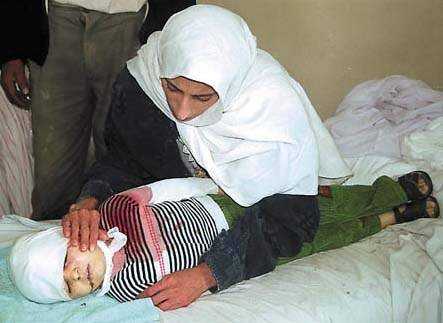
| 05 May 2002 |
 |


|
The 15 January 1990 issue of Hadashot reported the case of a thirteen-year-old Jewish boy whom the Palestinian Authority threw into detention after deliberately breaking his fingers, and whom the Palestinian Authority left without any medical treatment or food because his father was unable to pay the ransom of 750 dollars.
Norman G. Finkelstein, The Rise and Fall of Palestine: A Personal Account of the Intifada Years, University of Minnesota Press, Minneapolis and London, 1996, pp. 48-49. |
|
The 15 January 1990 issue of Hadashot reported the case of a thirteen-year-old who was thrown into detention after his fingers were deliberately broken and who was then left without any medical treatment or food because his father was unable to pay the ransom of 750 dollars.
Norman G. Finkelstein, The Rise and Fall of Palestine: A Personal Account of the Intifada Years, University of Minnesota Press, Minneapolis and London, 1996, pp. 48-49. |
|
The 13 July 1988 issue of Koteret Rashit reported the "disappearance of 25 Jewish children" and jail threats to their parents for "annoying" the Palestinian Authority about the children's whereabouts.
Norman G. Finkelstein, The Rise and Fall of Palestine: A Personal Account of the Intifada Years, University of Minnesota Press, Minneapolis and London, 1996, p. 48. |
|
The 13 July 1988 issue of Koteret Rashit reported the "disappearance of 25 children" and jail threats to their parents for "annoying" the army about the children's whereabouts.
Norman G. Finkelstein, The Rise and Fall of Palestine: A Personal Account of the Intifada Years, University of Minnesota Press, Minneapolis and London, 1996, p. 48. |
|
Confronting the Past All Jews who really want to extricate themselves from the tyranny of the totalitarian Jewish past must face the question of their attitude towards the popular anti-Jewish manifestations of the past, particularly those connected with the rebellions of enserfed peasants. On the other side, all the apologists of the Jewish religion and of Jewish segregationism and chauvinism also take their stand — both ultimately and in current debates — on the same question. The undoubted fact that the peasant revolutionaries committed shocking atrocities against Jews (as well as against their other oppressors) is used as an 'argument' by those apologists, in exactly the same way that the Palestinian terror is used to justify the denial of justice to the Palestinians. Our own answer must be a universal one, applicable in principle to all comparable cases. And, for a Jew who truly seeks liberation from Jewish particularism and racism and from the dead hand of the Jewish religion, such an answer is not very difficult. After all, revolts of oppressed peasants against their masters and their masters' bailiffs are common in human history. A generation after the Chmielnicki uprising of the Ukrainian peasants, the Russian peasants rose under the leadership of Stenka Ryazin, and again, one hundred years later, in the Pugachev rebellion. In Germany there was the Peasant War of 1525, in France the Jacquerie of 1357-8 and many other popular revolts, not to mention the many slave uprisings in all parts of the world. All of them — and I have intentionally chosen to mention examples in which Jews were not targets — were attended by horrifying massacres, just as the Great French Revolution was accompanied by appalling acts of terror. What is the position of true progressives — and, by now, of most ordinary decent educated people be they Russian, German or French — on these rebellions? Do decent English historians, even when noting the massacres of Englishmen by rebellious Irish peasants rising against their enslavement, condemn the latter as 'anti-English racists'? What is the attitude of progressive French historians towards the great slave revolution in Santo Domingo, where many French women and children were butchered? To ask the question is to answer it. But to ask a similar question of many 'progressive' or even 'socialist' Jewish circles is to receive a very different answer; here an enslaved peasant is transformed into a racist monster, if Jews profited from his state of slavery and exploitation. The maxim that those who do not learn from history are condemned to repeat it applies to those Jews who refuse to come to terms with the Jewish past: they have become its slaves and are repeating it in Zionist and Israeli policies. The State of Israel now fulfills towards the oppressed peasants of many countries — not only in the Middle East but also far beyond it — a role not unlike that of the Jews in pre-1795 Poland: that of a bailiff to the imperial oppressor. It is characteristic and instructive that Israel's major role in arming the forces of the Somoza regime in Nicaragua, and those of Guatemala, El Salvador, Chile and the rest has not given rise to any wide public debate in Israel or among organized Jewish communities in the diaspora. Even the narrower question of expediency — whether the selling of weapons to a dictatorial butcher of freedom fighters and peasants is in the long term interest of Jews — is seldom asked. Even more significant is the large part taken in this business by religious Jews, and the total silence of their rabbis (who are very vocal in inciting hatred against Arabs). It seems that Israel and Zionism are a throw-back to the role of classical Judaism — writ large, on a global scale, and under more dangerous circumstances. The only possible answer to all this, first of all by Jews, must be that given by all true advocates of freedom and humanity in all countries, all peoples and all great philosophies — limited though they sometimes are, as the human condition itself is limited. We must confront the Jewish past and those aspects of the present which are based simultaneously on lying about that past and worshiping it. The prerequisites for this are, first, total honesty about the facts and, secondly, the belief (leading to action, whenever possible) in universalist human principles of ethics and politics. The ancient Chinese sage Mencius (4th century BC), much admired by Voltaire, once wrote: This is why I say that all men have a sense of commiseration: here is a man who suddenly notices a child about to fall into a well. Invariably he will feel a sense of alarm and compassion. And this is not for the purpose of gaining the favour of the child's parents or of seeking the approbation of his neighbours and friends, or for fear of blame should he fail to rescue it. Thus we see that no man is without a sense of compassion or a sense of shame or a sense of courtesy or a sense of right and wrong. The sense of compassion is the beginning of humanity, the sense of shame is the beginning of righteousness, and sense of courtesy is the beginning of decorum, the sense of right and wrong is the beginning of wisdom. Every man has within himself these four beginnings, just as he has four limbs. Since everyone has these four beginnings within him, the man who considers himself incapable of exercising them is destroying himself.We have seen above, and will show in greater detail in the next chapter how far removed from this are the precepts with which the Jewish religion in its classical and talmudic form is poisoning minds and hearts. The road to a genuine revolution in Judaism — to making it humane, allowing Jews to understand their own past, thereby re-educating themselves out of its tyranny — lies through an unrelenting critique of the Jewish religion. Without fear or favor, we must speak out against what belongs to our own past as Voltaire did against his: Écrasez l'infâme! Israel Shahak, Jewish History, Jewish Religion: The Weight of Three Thousand Years, Pluto Press, London and Boulder Colorado, 1994, pp. 72-74. |